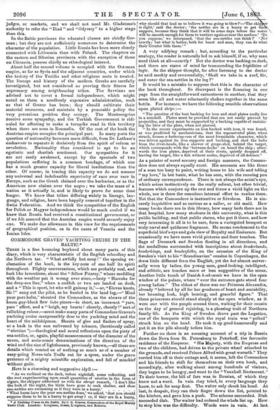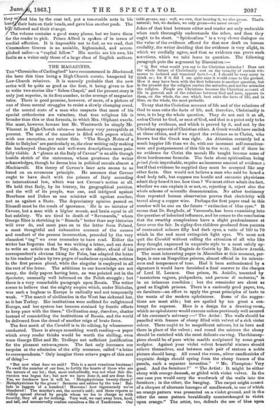COMMODORE GRAVES' YACHTING CRUISE IN THE BALTIC.*
THERE is a fine bouncing boyhood about many parts of this diary, which is very characteristic of the English schoolboy and the Northern tar. "What awfully hot soup !" the opening ex- clamation of the book, is the key-note of one half its spirit throughout. Flighty conversations, which are probably real, and look like inventions, about the "fellow Fitzroy," whose meddling with the weather put it wrong ever since,—lusty "Hurrahs for the deep-sea line," when a codfish or two are landed on deck, and a "This is sport, let who will gainsay it,"—or, "Eleven knots, Sir 1" sung out the pilot, as he hauled in the land log,--" Mind your port-helm," shouted the Commodore, as the sheave of the boom guy-block flew into pieces—in short, an incessant " yare, yare " effect, and a " heigh, my hearts cheerly, cheerly I" sort of rollicking colour,—must make many parts of Commodore Graves's yachting cruise inexpressibly dear to the yachting mind and the heart of the midshipman. Shouts of glee and flashes of spray, or a bask in the sun enlivened by tobacco, (facetiously called "nicotine ")—theological and moral reflections upon the piety of sea-nettles, or, again, playful measurements of the diameter of the moon, and serio-comic determinations of the direction of the wind and the size of lighthouses, previously known,—all these are details which remind us of nothing so much as of a number of easy-going Norse-tale Trolls out for a spree, under the grave
pretence of a mighty scientific exploration, and full of mischief without guile.
Here is a charming and suggestive idyll :—
" As we reclined on the deck, before nightfall, some reflecting, and the rest experimenting upon small quantities of nicotine in the form of cigars, the skipper addressed us with the abrupt remark, I don't like the look of the night, the birds have gone to seek shelter, and those
sea-nettles are swimming as if they were in a hurry.' . . . . What harm have the poor sea-nettles done,' we asked, that you should suppose them to be in s hurry to get away ? or, if they are in a hurry,
• A Yachting Cruise in the Balite. By S. N. Gravel, Commodore of the Royal Mersey Yacht Club. London: Longman, Green, Lmgman, and Roberts. why should that lead us to believe it was going to blow?'—`The skip is right,' said the doctor • the nettles are in a hurry to get the suppers, because they think that it will be some days before the water will be smooth enough for them to venture again so near the surface.' Do you suppose,' we interposed, 'that the sea-nettles can think?' ' Nct exactly; but what is better, both for beast and man, they can do what their Creator bids them.'" A very edifying remark ; but, according to the particular analogy, the reader is naturally led to ask himself, if so, why man need think at all—exactly ? But the doctor was basking on deck, and there are states of mind far transcending the frigidities of logic. So the skipper thought, for after listening to the doctor he said meekly and reverentially, Shall we take in a reef, Sir, and enter the sea-nettles in the log ?"
It would be a mistake to suppose that this is the character of the book throughout. So discrepant is the flouncing in one page from the straightforward earnestness in another, that they seem like oil and water reluctantly shaken together in the same bottle. For instance, we have the following sensible observations upon plated ships :—
" The question of the best backing for iron and steel plates really lies in a nutshell. Plates must be provided that are not easily pierced by projectiles, and they must be supported by a backing capable of sustain- ing the blow of the plate, when not pierced.
"In the recent experiments on iron backed with iron, it was found, as was predicted by mechanicians, that the unpenetrated plate, when struck, became a battering-ram of the most formidable character, which was driven against its iron supports and backing, and shot the bolts from the rivet-heads, like a shower of grape-shot, behind the target, which corresponds with the between ducks' on board the ship ; after- wards the iron plates, deprived of their rivets, quietly dropped off, leaving the target, like a fish without scales, deprived of all defence."
As a painter of novel scenery and foreign manners, the Commo- dore does not always equally excel. His accounts are like those of a man too busy to paint, writing home to his wife and telling "my love," in hot haste, what he has seen, with the running pen of ordinary correspondence. There is not always the artist's eye, which seizes instinctively on the really salient, but often trivial, features which conjure up the rest and throw a vivid light on the whole, nor is there the conscious internal effort to realize them. Not that the Commodore is inattentive or frivolous. He is sin- cerely inquisitive and as curious as a sailor, or old maid. How many books there are in this library, how many beds there are in that hospital, how many students in this university, what is this public building, and that public statue, who put it there, and how very interesting it all is to be sure, form a variegated bouquet oi truly naval and quidnunc fragrance. He seems condemned to the superficial bird's-eye and gala view of Royalty and Eminence. But occasionally we have more vivid pictures and finer touches. The flags of Denmark and Sweden floating in all directions, and the medallions surrounded with inscriptions about broderlands, broderkings, and broderfolks, on the occasion of the King of Sweden's visit to his "Scandinavian" cousins in Copenhagen, the dress little different from the English, yet the hat almost univer- sally worn by ladies, the young men, good-looking, intelligent, and athletic, are touches more or less suggestive of the scene. Another little touch of Danish bunh9nimie we have in the open window of the palace, where "over the entrance-gate stood four young ladies." The eldest of these was our Princess Alexandra, already "beloved by all for her goodness of heart and amiability, her beaming look, high bearing, and graceful figure." That these princesses should stand simply at the open window, as it were one with the people around them, waiting for their cousin on the day of general rejoicing, is a pleasing trait of Northern family life. As the King of Sweden drove past the Legation, one of the bouquets with which the royal train was "pelted" struck him on the head. He took it up good-humouredly and put it on the pile already before him.
Further on there is an amusing account of a trip in Russia down the Neva from St. Petersburg to Peterhoff, the favourite residence of the Emperor. "His Majesty, with the Empress and two of the children, had driven to the private wharf attached to the grounds, and received Prince Alfred with great warmth." They carried him off to their cottage and, it seems, left the Commodore and his friends to shift for themselves on their own hook, and accordingly, after walking about among hundreds of visitors, they began to be hungry, and went to the "Vauxhall Restaurant.' To their horror, the bill of fare was in Russian, of which they knew not a word. In vain they tried, in every language they knew, to ask for soup first. The waiter only shook his head. At last, in despair, they ran their finger down the list, pointed to the kitchen, and gave him a push. The scheme succeeded. Dish succeeded dish. The waiter had ordered the whole list up. How to stop him was the difficulty. Words were in vain, At last they sexed him by the coat tail, put a ten-rouble note in his band'- their hats on their heads, and gave him another push. The biya followed and their change.
,/ The volume contains a good many plums, but we leave them for the reader to pick. Prince Alfred is spoken of in terms of cordial affection. It is impossible not to feel, as we read, that Commodore Graves is an amiable, highmindecl, and accom- plished sailor—a "capital fellow." His merits are his own, his faults as a writer only those of a large class of English authors.































 Previous page
Previous page